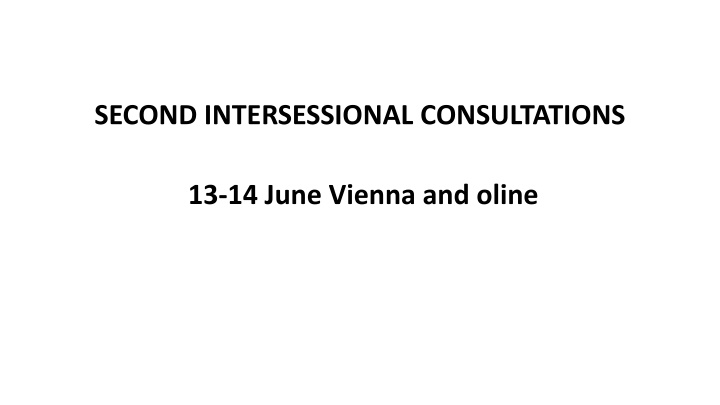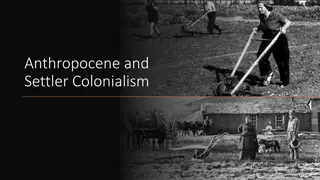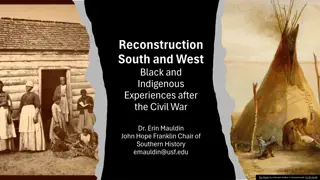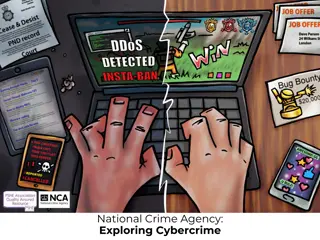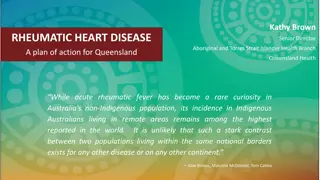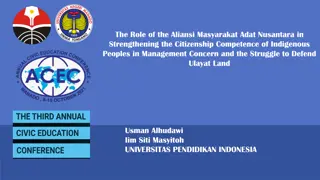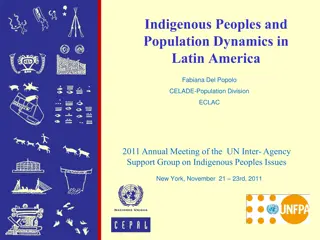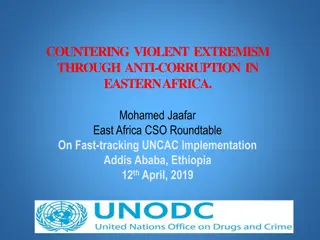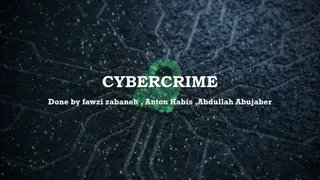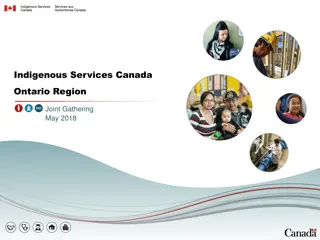Role of Civil Society and Indigenous Peoples in Countering Cybercrime
Civil society and indigenous peoples play a crucial role in the implementation of the International Convention on Countering the Use of Information and Communications Technologies for Criminal Purposes at national levels. Cybercrime encompasses various activities, ranging from fraud and identity theft to cyber espionage. Involving these organizations in the legislative process is essential to combat such criminal activities effectively.
Download Presentation

Please find below an Image/Link to download the presentation.
The content on the website is provided AS IS for your information and personal use only. It may not be sold, licensed, or shared on other websites without obtaining consent from the author.If you encounter any issues during the download, it is possible that the publisher has removed the file from their server.
You are allowed to download the files provided on this website for personal or commercial use, subject to the condition that they are used lawfully. All files are the property of their respective owners.
The content on the website is provided AS IS for your information and personal use only. It may not be sold, licensed, or shared on other websites without obtaining consent from the author.
E N D
Presentation Transcript
SECOND INTERSESSIONAL CONSULTATIONS 13-14 June Vienna and oline
Our topic to develop Our topic to develop "The role of civil society and indigenous peoples' organizations in all processes of the implementation of the International Convention on Countering the Use of Information and Communications Technologies for Criminal Purposes at National levels"
What is cybercrime? What is cybercrime? Most cybercriminal activities (but not all) are committed by cybercriminals or hackers who want to make money. Individuals or organizations are behind cybercrime. Some cybercriminals are organized, use sophisticated techniques and are technically very skilled. Others are novice hackers. In rare cases, cybercrime aims to damage computers for reasons other than pecuniary, which may be political or personal.
Types of cybercrime Types of cybercrime Here are some specific examples of the different types of cybercrime: Fraud by email and via the Internet. Identity theft (when personal information is stolen and used). Theft of bank details or financial data. Theft and sale of corporate data. Cyber extortion (demanding money so that a threat of attack does not materialize). Ransom ware attacks (a type of cyber extortion). Crypto jacking (the diversion of resources by hackers to mine crypto currency). Cyber espionage (when hackers gain access to government or corporate data).
CS and indigenous peoples organizations CS and indigenous peoples organizations contribution in the implementation of contribution in the implementation of the the International Convention on Countering the International Convention on Countering the Use of Information and Communications Use of Information and Communications Technologies for Criminal Purposes at national Technologies for Criminal Purposes at national levels. levels. The civil society and indigenous peoples' organizations are critically necessary to be involved in the elaboration of legislation to counter the kind of criminality and other abuses done through the information communication technology.
The process of involvement of civil society and The process of involvement of civil society and indigenous peoples organizations indigenous peoples organizations To be implemented fully, civil society and indigenous peoples organizations have the critical responsibility to collaborate with the governments so that the articles of international convention to fight against the abuses and criminality committed through communication and information technologies have to be incorporated in the legislation at national levels for being adopted by parliaments and enacted by governments.
In this regard, civil society and indigenous peoples organizations have the key role to organize the campaigns to show how governments could create a national mechanism to counter the cyber criminality and to protect the interests of the population including indigenous peoples' rights through the implementation aligned with to the legislation inspired by the said international convention having to be ratified by the governments
Civil society and indigenous peoples organizations advocacy at national level Through the advocacy, civil society and indigenous peoples organizations are necessary to be committed to showing and making understanding to the national parliaments and other bodies of governments that will ratify this international convention in the framework of implementing the common actions, such as cybersecurity, compensation to the victims, to counter the cyber criminality and protect the population and indigenous peoples face the crimes committed through the Information and communication technology.
The follow up the implementation of The follow up the implementation of the International Convention on Countering International Convention on Countering the Use of Information and Communications the Use of Information and Communications Technologies for Criminal Purposes at the Technologies for Criminal Purposes at the National levels National levels the The civil society and indigenous peoples' organizations will follow up the implementation of the national laws having to be applied on aligning with this international convention to fight against the abuses and criminality committed throughout communication
The role of civil society and Indigenous peoples The role of civil society and Indigenous peoples organizations to encourage the organizations to encourage the gouvernements the national parliaments to implement fully the said the national parliaments to implement fully the said international convention international convention gouvernements including including The civil society and indigenous peoples organizations will make an appeal to governments and national parliaments to enact the common decision and actions contributed by all stakeholders without leaving no behind. These will bring the added value in terms of protecting vulnerable persons such as indigenous peoples, women, and youth facing the negative impact of criminality in the world.
T The place of civil society and indigenous peoples' organizations he place of civil society and indigenous peoples' organizations for extending the implementation of the said international for extending the implementation of the said international convention in the communities convention in the communities As in the national and international community, civil society and indigenous peoples' organizations have a crucial role to participate in the UN treaty body review of the implementation of said international convention by governments. The contribution of the civil society and indigenous peoples' organizations during the process of review can maximize the better way to know if the said international convention has been implemented to formulate the recommendations so that the governments are fully completed, at the national levels, their obligations of implementing the legislation inspired by the articles of the international convention and to protect the victims from cybercriminals.
Na National and International Solidarity tional and International Solidarity To end the criminality committed through the information and communication technology, the UN, governments, the civil society, and indigenous peoples' organizations as well as the private sectors are encouraged to create the cooperation, the protection system of databases, and the international mechanism of control of the cyber criminality. in that regard, cyber criminality will be in control and the integrity and countries' sovereignty will ensure for all. It is also paramount to set up a global controlling server for the governments and key civil society and indigenous organizations to assure international solidarity.
SEVERIN SINDIZERA Tel: +25779991315 Email : sevzera@yahoo.fr
